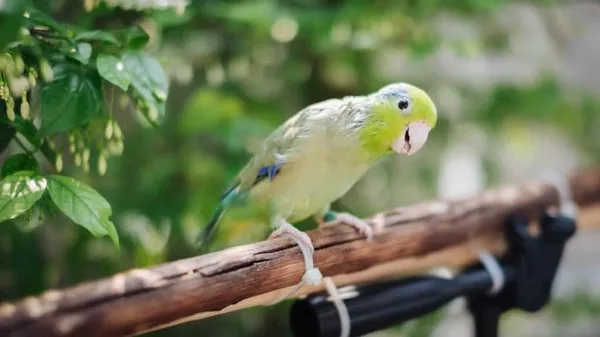Indian Ringneck Parrots, also known as Rose-ringed Parakeets, are beloved and intelligent birds that require a diverse and nutritious diet to thrive. Fruits are an essential component of their diet, providing valuable vitamins, minerals, and natural sugars. However, it’s crucial to understand which fruits are safe and beneficial for Indian Ringnecks to consume. In this article, we will explore a variety of fruit options that are suitable for Indian Ringnecks, highlighting their nutritional benefits and offering guidance on portion sizes and potential risks.
Understanding the Nutritional Benefits of Fruits for Indian Ringnecks
Fruits offer a range of essential nutrients that are beneficial for Indian Ringneck Parrots. They are rich in vitamins, minerals, and antioxidants, which contribute to their overall health and well-being. Some key nutritional benefits of incorporating fruits into their diet include:
Vitamins: Fruits are a natural source of various vitamins, including vitamin A, vitamin C, and various B vitamins. These vitamins support the Indian Ringneck’s immune system, feather health, and overall vitality.
Minerals: Fruits contain minerals such as potassium, calcium, and magnesium, which are important for maintaining healthy bones, muscles, and nerve function in Indian Ringnecks.
Dietary Fiber: Fruits are a good source of dietary fiber, which aids in digestion and helps prevent constipation in Indian Ringnecks. Fiber also promotes a healthy gut microbiome.
Hydration: Many fruits have high water content, contributing to hydration for Indian Ringnecks. Proper hydration is essential for maintaining overall health and bodily functions.
Safe and Nutritious Fruits for Indian Ringnecks
When offering fruits to your Indian Ringneck Parrot, it’s important to choose options that are safe and provide optimal nutritional value. Here are some fruits that are suitable for Indian Ringnecks:
Apples: Apples are a popular fruit choice for Indian Ringnecks. They are a good source of fiber, vitamin C, and antioxidants. Ensure that the apple slices are seedless and remove the core and stem before offering them to your parrot.
Grapes: Grapes are a hydrating fruit option for Indian Ringnecks. They contain vitamins C and K, as well as antioxidants. Cut grapes into smaller pieces or halve them to prevent choking hazards.
Berries: Blueberries, strawberries, raspberries, and blackberries are all safe and nutritious for Indian Ringnecks. Berries are rich in antioxidants, vitamins, and fiber. Wash berries thoroughly and cut them into appropriate sizes for your parrot.
Melons: Watermelon, cantaloupe, and honeydew melons can be offered to Indian Ringnecks. These fruits are hydrating and contain vitamins A and C. Remove the seeds and rind, and provide small, bite-sized pieces.
Papaya: Papaya is a tropical fruit that Indian Ringnecks can enjoy. It is a good source of vitamin C, fiber, and digestive enzymes. Remove the seeds and offer small pieces of ripe papaya to your parrot.
Kiwi: Kiwi is a nutrient-rich fruit that provides vitamins C, E, and K to Indian Ringnecks. Peel the skin off and offer small, diced pieces.
Portion Sizes and Frequency
While fruits offer nutritional benefits, it’s important to feed them to your Indian Ringneck in moderation and as part of a balanced diet. Fruits should not exceed 10-15% of their overall daily food intake. Aim for variety and rotate different fruits to provide a diverse range of nutrients.
Offer small portions of fruit, such as a few small pieces or slices, depending on the size of your Indian Ringneck. Always monitor their intake and observe their response to ensure they are tolerating the fruits well.
Potential Risks and Precautions
While fruits are generally safe for Indian Ringnecks, there are a few considerations to keep in mind:
Pesticide Residues: To minimize pesticide exposure, choose organic fruits or thoroughly wash conventionally grown fruits before offering them to your Indian Ringneck.
Seeds and Pits: Remove all seeds, pits, and cores from fruits, as they can be toxic or pose a choking hazard for Indian Ringnecks.
Allergies and Individual Sensitivities: Just like humans, birds can have allergies or sensitivities to certain fruits. Introduce new fruits gradually and observe your Indian Ringneck for any signs of adverse reactions. If you notice any digestive upset, itching, or unusual behavior, discontinue the fruit and consult with an avian veterinarian.
Conclusion
Incorporating a variety of safe and nutritious fruits into the diet of your Indian Ringneck Parrot is a wonderful way to provide them with essential vitamins, minerals, and antioxidants. Apples, grapes, berries, melons, papaya, and kiwi are just a few examples of fruits that can contribute to their overall health and well-being. Remember to offer fruits in moderation, rotate different options, and remove any seeds or pits to ensure their safety. By offering a balanced diet that includes a selection of safe fruits, you can enhance the nutritional quality of your Indian Ringneck’s diet and contribute to their vibrant and happy life.
Related Topics:


























